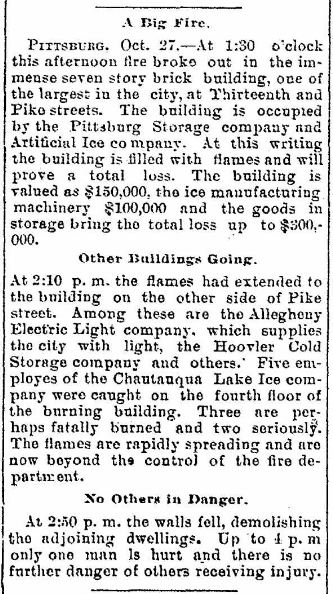Image from Life in Western Pennsylvania
FIRE CAUSES A PANIC.
EIGHT PERSONS BADLY BURNED IN PITTSBURG.
Employee Unable to Escape from a Big Building — Walls Fall and Crush Adjoining Houses — Many Persons Hurt in the Crowd.
PITTSBURG, Pa., Oct. 28. — The explosion of a barrel of whisky in the big warehouse of the Chautauqua Lake Ice company yesterday afternoon caused the destruction of over $500,000 worth of property and serious injury to eight persons. Several of the injured, it is feared, will die. A score of more of others received slight cuts and bruises or were trampled on by the mob surrounding the burning buildings. Those seriously hurt were:
T.J. HEILMAN, married; dropped from the third floor to the ground; hands and face terribly burned. His injuries are considered fatal.
MARTIN GRIFFITH, married; dangerously burned.
EDWARD SEES, body and head badly burned; may not recover.
WILLIAM COX, dangerously burned about face and body.
W.M. SMITH, painfully burned; will recover.
LIEUT. FRANK McCANN of engine No. 7; struck by falling bricks and left leg broken.
WILLIAM WISMAN, struck by falling timbers and skull fractured.
JOHN REISCHE, badly hurt by falling timbers.
It was just twenty minutes after 1 o’clock when a number of employes on the third floor of the ice company’s buildings were startled by a loud report, and almost instantly the large room was ablaze. The men started for the stairs, but the flames had already cut off their retreat, and the only means of exit left them were the windows, fifty feet from the ground. By this time the heat was so intense that they were forced to creep out upon the window sills and hang by their hands until the fire department arrived. The flames bursting from the windows burned their hands and faces, but they hung their until the firemen placed their ladders in position and brought them down.
To aid to the excitement it was discovered that a large tank of ammonia was located in the cellar of the ice company’s building, and the police, fearing an explosion, quickly ordered the occupants of the houses on Twelfth street to vacate. All the houses in the neighborhood are a cheap class of tenements and crowded to suffocation with Poles and Slavs. When they were told to move out a panic indescribable started among them. House-hold goods store goods, children and everything that could be carried away were rushed to a place of safety.
The walls of the Mulberry alley side fell in with a crash and a few minutes later the eastern wall came down. The debris buried a low row of tenements in the alley and a three-story brick dwelling on Thirteenth street. The tenements were occupied by families, but fortunately they had been deserted some time before the walls fell in. Not one of the families had a chance to save any of their goods and all their furniture was destroyed. The ruins took fire immediately, and for a while the entire tenement district of Penn avenue was threatened with destruction.
When the walls of the big buildings fell the great mob of people made a rush to get out of danger. Many men tripped and fell and were trampled under foot. Several received painful but not dangerous bruises. Sheets of iron were cast from the burning buildings by the fury of the flames and hurled into the crowds. Scores of people received slight injuries, which were dressed in neighboring drug stores.
The Daily Review (Decatur, Illinois) Oct 29, 1893
Another article about the same fire:(I think the above newspaper got the date wrong)
Davenport Daily Leader (Davenport, Iowa) Oct 27, 1893
Again with the whisky barrels? Really?
MAY REACH TWENTY-FIVE DEAD.
Pittsburg. Feb 10. — The lost of life and property by the fire last night in the great cold storage plant of the Chautauqua Lake Ice company, was the greatest in the history of Pittsburg. At least fifteen persons were killed, over a score injured and property valued at a million and one-half destroyed. The loss of life was caused by the explosion of several hundred barrels of whisky in the ware house, knocking out one of the walls.
The dead are: Lieut. of Police John A. Berry, John Dwyer, William Scott, Jr., the son of President Scott of the Chautauqua State Ice Co.; Stanley Seitz, George Loveless, Mrs. Mary Sipe and her mother; Stanley Sipe, Lieut. Josep Johnson, a fireman name unknown; William L. Wallenstein, and three unknown men.
The missing are: Nathaniel Green, accountant of the Dailmerer building, supposed to be in the ruins; Thomas Lynch, iceman in the employ of the Chautaqua company, supposed to be in the ruins; Edward Berry watchman of the storage building.
It is believed that at least ten more bodies are in the ruins, which are still too hot to be moved. The principal losses are: Union Storage company, $775,900; Hoever’s Storage Warehouse and contents, $600,000; Chautauqua Ice company, $150,000.
Three more bodies were taken from the ruins this forenoon. The dead it is now thought will reach 25. Those taken out this morning were: John Hanna, Bookkeeper and cashier of the Chautauqua Lake Ice Co.; John Scott, another son of President Scott, and an unknown fireman.
_____
Later. — But eight bodies were recovered instead of 14, as first reported. Four are missing, and the firemen believe that a number of others are still under the ruins. The correct list of the identified dead is Lieut. Police Berry; John Dwyer, William Scott, Jr., Stanley Sipe, George Loveless, William A. Wallrobenstein, Josiah Hanna, and William Smith. The missing, Nathaniel Green, Thomas Lynch, John Scott and Edwin Barry.
Davenport Daily Leader (Davenport, Iowa) Feb 10, 1898
* * * * *
More about the Chautauqua Lake Ice Company:
The Olean Democrat (Olean, New York) Mar 14, 1889
The Olean Democrat (Olean, New York) Jan 15, 1891









